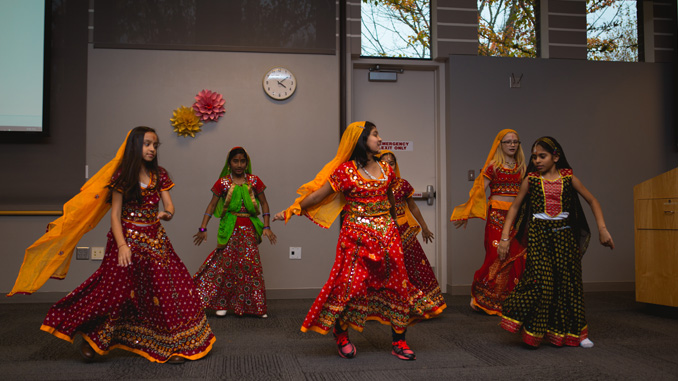Students, staff, and faculty had a chance to participate in Diwali in the Firstenburg Student Commons on Nov. 7. According to Forbes contributor, Tarandip Kaur, Diwali is derived from the Sanskrit, and is translated as “series of lighted lamps.” It may be the biggest annual festival celebrated in India; however, the lighting of both oil lamps and candles happens globally and is recognized by several different religions.
Even though the significance of the festival may vary depending on a particular culture, the purpose of each Diwali celebration is to recognize the reciprocity of family, gratitude, friends and, most importantly, kinship.
The Diwali at WSU Vancouver celebrated community through an exchange of peace and kindness. Renny Christopher, the Vice-Chancellor for Academic Affairs, stated at the event that the festival itself is “about stories of hope, of justice, of thanks and of community.”
The event, however, was no casual hangout. It was distinct as being the first event at WSU Vancouver to pay tribute to a holiday celebrated by Hindu, Sikh, and Jainism cultures. Diwali allowed members of the local community to become a part of a Southern Asian tradition.
Sujatha Shynne, an IT systems specialist, kicked off the event reminding the audience that “Diwali is a time for friends, food, and family.”
Pavithra Narayanan, program leader for the English department, said WSU Vancouver is “the homeland of Chinookan and Taitnapam peoples and the Cowlitz Indian Tribe.” Narayanan extended her gratitude to Diversity Council, Associated Students of Washington State University Vancouver, Student Activities Board, and student coordinators Sujatha Shynne and Navaraj Lamichhane, for making the event possible.
U.N. Umesh, a professor of marketing, provided some anecdotes about his professional experience on campus, insights into the Southern Asian tradition, and encouraged the crowd to engage with claps and laughter.
High attendance testified to the solidarity of Diwali organizers. The roughly 200 participants including organizers and members from the local community danced, laughed, ate, and chatted through the night.
The dancing, along with the cadence and movement of lights, proved to be a fitting decorum for the Firstenburg Student Commons, a popular venue for student get-togethers and events.
Attendees had a chance to try popular vegetarian options from the Southern Indian cuisine. Among them were palak paneer and naan bread. Special drinks, such as lassi and chai Tea, were provided by the cafeteria.
With dancing, storytelling, decorations and henna tattoos, the Diwali provided a number of ways to celebrate.
